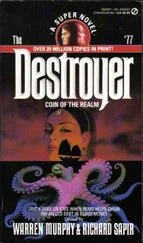Warren Murphy - Ghost in the Machine
Здесь есть возможность читать онлайн «Warren Murphy - Ghost in the Machine» весь текст электронной книги совершенно бесплатно (целиком полную версию без сокращений). В некоторых случаях можно слушать аудио, скачать через торрент в формате fb2 и присутствует краткое содержание. Жанр: Детективная фантастика, на английском языке. Описание произведения, (предисловие) а так же отзывы посетителей доступны на портале библиотеки ЛибКат.
- Название:Ghost in the Machine
- Автор:
- Жанр:
- Год:неизвестен
- ISBN:нет данных
- Рейтинг книги:5 / 5. Голосов: 1
-
Избранное:Добавить в избранное
- Отзывы:
-
Ваша оценка:
- 100
- 1
- 2
- 3
- 4
- 5
Ghost in the Machine: краткое содержание, описание и аннотация
Предлагаем к чтению аннотацию, описание, краткое содержание или предисловие (зависит от того, что написал сам автор книги «Ghost in the Machine»). Если вы не нашли необходимую информацию о книге — напишите в комментариях, мы постараемся отыскать её.
Ghost in the Machine — читать онлайн бесплатно полную книгу (весь текст) целиком
Ниже представлен текст книги, разбитый по страницам. Система сохранения места последней прочитанной страницы, позволяет с удобством читать онлайн бесплатно книгу «Ghost in the Machine», без необходимости каждый раз заново искать на чём Вы остановились. Поставьте закладку, и сможете в любой момент перейти на страницу, на которой закончили чтение.
Интервал:
Закладка:
Destroyer 90: Ghost in the Machine
By Warren Murphy and Richard Sapir
Chapter 1
Randal T. Rumpp lived by the telephone.
The lowly telephone was the symbol of his empire, his great fame, his vast wealth. In his hands, it was transformed from a mere instrument for idle conversation into a lightning rod for raw money.
Randal Rumpp was never far from the telephone. A bank of them sat on his office desk. Cellular units filled every car and yacht he owned. When the maid set his table, there was a cellular handset where the salad fork should be. In restaurants, the maitre d' would see to it that Mr. Rumpp's special table-and he had special tables in restaurants throughout Manhattan, Paris, and other world-class cities-was set with a telephone to the immediate left of the dinner fork.
For alleged billionaire Randal Tiberius Rumpp was a maker of deals. And deals were best made by telephone.
On the day the telephones stopped ringing all over the Rumpp Tower, Randal T. Rumpp, for the first time in his life, lived in fear of their clarion call.
He arrived at six in the morning and put to his executive assistant the crisp question always asked of her.
"Any calls, Dorma?"
"No, Mr. Rumpp."
And for the first time in his meteoric career, Randy Rumpp-as the tabloids and gossip columnists styled him-was pleased to hear that there had been no messages lying in wait for him. Usually, the messages were stacked to the ceiling. From Tokyo. From Hong Kong. From Zurich. There were always deals swirling around Randy Rumpp's pompadoured head.
Those kind of calls had long ago ceased to pour in.
Now, the only people who called were his creditors. If there were no messages, then the banks hadn't yet foreclosed on Randal Rumpp's last major trophies of an ill-spent business career: the Rumpp Tower, overlooking New York's Fifth Avenue, and the Rumpp Regis Hotel, up on Third.
Still, it was a blow to his ego.
"Are you sure?" he asked.
"I think the phone company is having problems again."
"Well," he said, "if anyone does call, take names and numbers. And try to give the impression that I'm too busy to get back time anytime soon. Okay?"
"Yes, Mr. Rumpp."
"Remember, we're selling success here."
"Yes. Mr. Rumpp."
Self-consciously, Randal Rumpp patted his famous sandy crown of hair and entered his sumptuous, cathedral-like office overlooking Central Park. He set down the Spanish leather briefcase that contained the cellular telephone that was his lifeline when he was between stationary phones, and removed the handset. The way the phone company was plagued by service interruptions these days, one couldn't be too careful.
Once, Randal Rumpp, on his way to a major deal, had had the misfortune to be stranded in an elevator.
First he called his broker, obtaining the latest market quotes. Second, he called for help.
It took twenty minutes for the maintenance people to pry the elevator doors apart and haul him from the cage that had been stuck between the fourteenth and fifteenth floors. In that short span of time, Randal Rumpp made a cool two million in a series of brilliant stock transactions. Flushed with success, he strode into his business meeting and, simply by announcing his good fortune, demoralized his business adversaries, who had in fact arranged for the elevator to malfunction in a blatant attempt to put him at a psychological disadvantage. Rumpp greenmailed them into bankruptcy court in less time than he had spent in that elevator.
Now, surrounded by the very instruments that had, during the heady days of the 1980s, made him into a multibillionaire who oversaw a real-estate empire that spread faster than lymph node cancer, Randal Rumpp fervently prayed they would start ringing again on this final day in October.
He strode over to his magnificent view of upper Manhattan. Directly across the street was a skyscraper of silvery polished glass, not nearly as tall and fine as the tower that bore Rumpp's proud name.
When the rival building had first been proposed, Randal Rumpp sued to have it quashed, claiming that it would ruin his unique view. When the higher courts threw out the suit, he resorted to other types of legal harassment.
Finally, the thing was finished. It had been intended to tower over the Rumpp Tower, but Randal Rumpp's law firm had so drained the financial resources of the development company that they were forced to strike the top ten floors from the original design. In its final form, it stood one story shy of matching the lofty eminence of his own Rumpp Tower. That single story was all that Randal Rumpp required. He had never cared much for the view, anyway. But he simply despised being bested in business.
While the dedication ceremony was taking place many floors below his twenty-fourth-floor aerie, Randal Rumpp dictated a memo to his head of PR stating that the offending building was the ugliest dwarf since Quasimodo.
The press, then in love with his every loutish witticism, printed it on page one. It became a Newsweek "Quote of the Week."
After the furor had died down, Rumpp dictated another memo.
"I've changed my mind," Rumpp said of the silvery skyscraper. "I like it. Every day when I come to work, I look out my office window and there it is: the Rumpp Tower, and me, reflected in the most expensive mirror ever built. And it cost the Rumpster nothing."
That was Randal Rumpp in his salad days. A gracious victor.
On this last day in October, Randal Rumpp stared out at the mirror-like surface across busy Fifth Avenue, and the reflection of his greatest holding.
The Rumpp Tower was as brassy as its namesake. It looked like a phantasm of polarized bronze-colored glass, and steel. Fragile enough to be shattered by the throw of a common stone.
The illusion was closer to the truth than Randal Rumpp would have cared to admit. The Rumpp empire had been erected of steel and glass and concrete and debt. Debt had never bothered Randal Rumpp in the 1980s. Debt wasn't real. It couldn't be cut like glass, drop-forged like steel, or poured like concrete. Yet it was the true foundation of Randal Rumpp's mighty real-estate holdings. The more he borrowed, the more Randal Rumpp was able to build and buy. And the more he built and bought, the more the banks would lend him. He went on the biggest buying spree in human history. There were only two criteria to catch his interest: The prize had to the best of its kind, and it had to have a blank area large enough to accommodate his last name in six-foot-high letters.
That pretty much limited his major purchases to buildings, luxury yachts, and private aircraft. Once Randal Rumpp had considered making an offer on the world's largest diamond, and hired the premier diamond-cutter in the world as a consultant. He changed his mind when the respected jeweler informed him that cutting his name into the Hope Diamond would seriously reduce its value.
"How seriously?" asked Randal Rumpp cautiously.
"Seriously enough to make it unsalable at any price."
"Listen, I've put my name on classier buys than that gaudy rock and resold them at a tidy profit."
"Worthless, Mr. Rumpp."
Disappointed, Rumpp went on to purchase a shuttle service, and soon had RUMPP SHUTTLE emblazoned on a fleet of 727s traversing the Northeast air corridor.
It all started to unravel with the junk bond fiasco. Still, even as his debts mounted, they were just numbers on a computer. The buildings still stood, the planes still flew, and the flow of cash, although not flowing overwhelmingly in Randal Rumpp's direction or favor, continued to flow. Payrolls were met. Rents came in. The bottom line, although fluctuating wildly, continued to be written. The top line was staggering. Best of all, the press continued to print his brash pronouncements.
Читать дальшеИнтервал:
Закладка:
Похожие книги на «Ghost in the Machine»
Представляем Вашему вниманию похожие книги на «Ghost in the Machine» списком для выбора. Мы отобрали схожую по названию и смыслу литературу в надежде предоставить читателям больше вариантов отыскать новые, интересные, ещё непрочитанные произведения.
Обсуждение, отзывы о книге «Ghost in the Machine» и просто собственные мнения читателей. Оставьте ваши комментарии, напишите, что Вы думаете о произведении, его смысле или главных героях. Укажите что конкретно понравилось, а что нет, и почему Вы так считаете.




